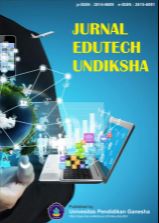PENGARUH MODEL PEMBELAJARAN KOOPERATIF TIPE STAD BERBANTUAN MULTIMEDIA PEMBELAJARAN TERHADAP HASIL BELAJAR PKN
DOI:
https://doi.org/10.23887/jeu.v3i1.5604Abstract
Hasil belajar PKn siswa kelas VII SMP di SMP Negeri 1 Sawan masih tergolong rendah, untuk itu dipandang perlu diadakan penelitian tentang pengaruh model pembelajaran kooperatif tipe STAD berbantuan multimedia pembelajaran terhadap hasil belajar PKn. Penelitian ini bertujuan untuk mengetahui perbedaan yang signifikan hasil belajar PKn siswa yang mengikuti model pembelajaran kooperatif tipe STAD berbantuan multimedia pembelajaran dan siswa yang mengikuti pembelajaran konvensional pada siswa kelas VII SMP Negeri 1 Sawan. Jenis penelitian ini adalah penelitian eksperimen semu. Populasi penelitian ini adalah seluruh siswa kelas VII SMP Negeri 1 yang berjumlah 10 kelas, yang berjumlah 338 siswa. Sampel penelitian diambil dengan teknik cluster random sampling. Jumlah sampel dalam penelitian adalah 2 kelas yang terdiri dari 62 siswa. Data diambil dengan menggunakan instrumen tes pilihan ganda, selanjutnya dianalisis dengan analisis statistik deskriptif dan statistik inferensial yaitu uji-t. Hasil penelitian menunjukkan terdapat perbedaan yang signifikan hasil belajar PKn siswa yang mengikuti model pembelajaran kooperatif tipe STAD berbantuan multimedia pembelajaran dan siswa yang mengikuti pembelajaran konvensional dengan t hitung 6,045 > t tabel 2,000. Hal ini berarti terdapat pengaruh penerapan model pembelajaran kooperatif tipe STAD berbantuan multimedia pembelajaran terhadap hasil belajar PKn siswa kelas VII di SMP Negeri 1 Sawan.Kata Kunci : STAD, multimedia, hasil belajar PKn
Civics education learning outcomes of students in 7th grade in SMP Negeri 1 Sawan still relatively low, it is necessary to more carefully conducted studies on the effects of cooperative learning models types STAD assisted multimedia learning on learning outcomes PKn. This research aims to differences of learning outcomes of civic education between students who followed cooperative learning types STAD assited multimedia learning and students who followed conventional learning on 7th grade in SMP Negeri 1 Sawan. This research is a quasi experimental research. Population of this research was all of students on 7th grade in SMP Negeri 1 Sawan consisted of 10 classes which the total was 338 students. Sample of this research was taken by cluster random sampling tehcnique. Total of sample in this research was 2 classes consisted of 62 students. The data were taken using a multiple-choice test instrument, then analyzed with descriptive statistical analysis and inferential statistics, namely t-test to test for differences in student learning outcomes.The results show there are differences in learning outcomes of civics education students who followed cooperative learning models types STAD assisted multimedia learning and learning with conventional learning models with t count 6,045 > t table 2,000 . This means there is effect application of cooperative learning model type STAD assisted multimedia learning for learning outcomes of Civics on 7th grade SMP Negeri 1 Sawan.
keyword : STAD, multimedia, learning outcomes of civic education
Published
2015-07-29
How to Cite
., I. G. A. A. N. C., ., D. I. M. T. S. M., & ., I. K. S. M. (2015). PENGARUH MODEL PEMBELAJARAN KOOPERATIF TIPE STAD BERBANTUAN MULTIMEDIA PEMBELAJARAN TERHADAP HASIL BELAJAR PKN . Jurnal Edutech Undiksha, 3(1). https://doi.org/10.23887/jeu.v3i1.5604
Issue
Section
Articles
License
Authors who publish with the Jurnal EDUTECH Undiksha agree to the following terms:
- Authors retain copyright and grant the journal the right of first publication with the work simultaneously licensed under a Creative Commons Attribution License (CC BY-SA 4.0) that allows others to share the work with an acknowledgment of the work's authorship and initial publication in this journal.
- Authors are able to enter into separate, additional contractual arrangements for the non-exclusive distribution of the journal's published version of the work (e.g., post it to an institutional repository or publish it in a book), with an acknowledgment of its initial publication in this journal.
- Authors are permitted and encouraged to post their work online (e.g., in institutional repositories or on their website) prior to and during the submission process, as it can lead to productive exchanges, as well as earlier and greater citation of published work. (See The Effect of Open Access)














